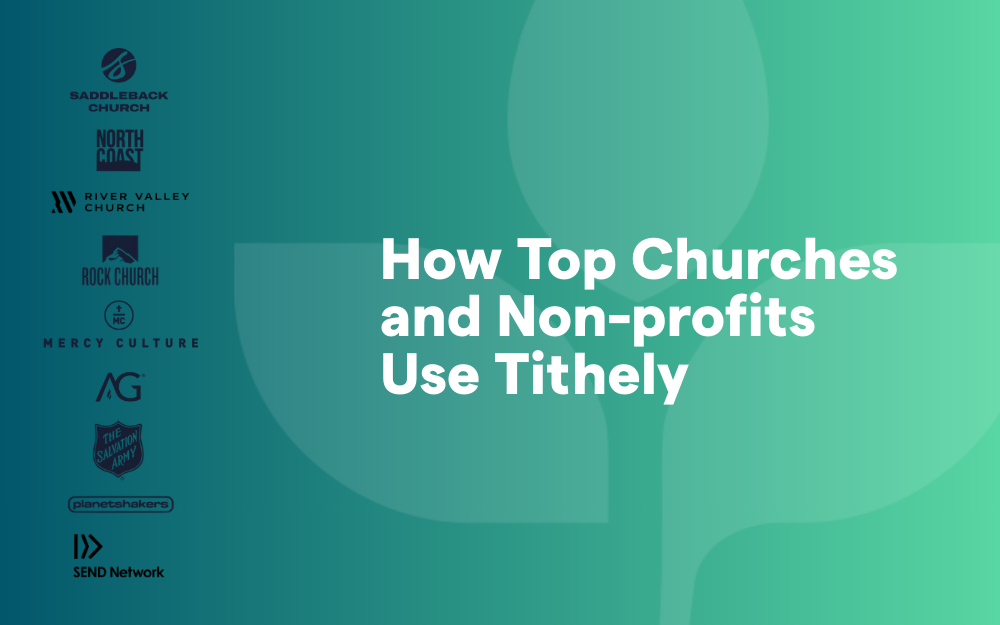3 Passages from Acts to Help You Talk About Giving
Tired of sermons about money? Try preaching from one of these giving passages.
.jpeg)
The New Testament is the story of how God gave His Son so that you and I could have our sins forgiven and receive eternal life. In that sense, it’s about giving through and through.
You can’t really understand the gospel message if you don’t realize your great need before God and His great mercy. And it is because God is such a lavish giver that we are called to be generous people too.
As a church leader, you want the people in your church to catch a vision for this lifestyle of generosity, but it’s not always easy to preach about money. Thankfully, the book of Acts contains quite a few passages where giving is a central theme.
We’ve already looked at a few similar passages in the Old Testament and in the Gospels, and now it’s time to turn our attention to the early church to see how we too can cultivate a life of generosity that honors God.
Here are just a few examples:
1. Ananias and Sapphira lie to the Holy Spirit (Acts 5:1–11). Some of the most powerful stories in the Bible offer examples of what not to do. In this way, the Holy Spirit is warning us so that we don’t make the same mistakes and suffer similarly. One such account is that of Ananias and Sapphira, a believing couple who were part of the early church in Jerusalem.
You probably know this story. Lots of folks were selling possessions and property and turning the proceeds over to the church leadership in Jerusalem in order to care for the poor. Ananias and Sapphira joined in, selling a piece of real estate and laying the proceeds at the feet of the apostles—except they didn’t give it all. They kept back a portion for themselves and then lied about it. God’s judgment was swift. Ananias, and later Sapphira, fell down dead when confronted with their sin.
It’s important to dispel some myths about Ananias and Sapphira. Contrary to what you may have heard, they were not phoney believers. There is no indication in the book of Acts that their trust in the Lord was anything but sincere prior to this passage. Also, it seems they did genuinely care about the poor. After all, no one forced them to sell anything or give a single drachma away. Their error was their deceit.
Giving is a privilege for believers, but when we do it to seem more pious, we sin. When we give to show off to other people, we sin. God calls us to be honest and transparent in our generosity. He doesn’t need our money; He wants our heart, undivided and on fire for Him.
2. Paul offers an otherwise unknown saying of Jesus to the Ephesian elders (Acts 20:17–35). Paul had ministered to the people in Ephesus for three years. He worked hard among the people, proclaiming the gospel and declaring the whole counsel of God. In other words, he didn’t shy away from the tough parts of Scripture, but shared all of its wisdom with the people.
In Acts 20, we get to read Paul’s parting words to the people of Ephesus? What would he leave behind for these saints with whom he’d shared so much life? Mainly, he left the Ephesian elders an example. He reminds them how he supported himself through the work of his own hands—tentmaking—so that he wouldn’t become a burden to the people or stand in the way of anyone responding to the gospel.
In explaining why he had not asked anyone for money or taken up a collection, he reminds them of something Jesus said. It’s a saying that’s not included in the four Gospels but is only found here in our Bibles: “It is more blessed to give than to receive” (Acts 20:35).
Here it is: the secret to a generous life. Giving isn’t something we do begrudgingly or even selflessly. Jesus said that when we give, we are the one who is most blessed.
Imagine that! In God’s economy, no one is worse off when we operate in a spirit of generosity. The recipient is blessed by the gift he or she receives, and the donor is blessed by the very act of giving. How are they blessed? By the Lord Himself.
God takes care of our needs. Everything we have is really His. We are His stewards, His managers in this world. When we give for kingdom purposes, He rewards His faithful servants—not necessarily with material repayment but with blessings much more valuable.
3. The early church corrects an error (Acts 6:1–7). We live in a day where diversity is on everyone’s mind. Especially in the church, we want to make sure that our communities and our sanctuaries are inviting places for people of every background. There’s something in our sinful nature that drives us to show favor toward those who are just like us. The early church had the same struggle.
Back in Acts 6, the church was still all Jewish. There were no Gentiles yet. Even so, there were Jewish Christians who stuck tightly to the customs and laws of ancient Israel, and there were those who adopted much of the Gentile culture that surrounded them. These Hellenists, as they were called, complained that their widows were being neglected when food was being given to those in need.
When this problem comes to light, there is no debate, there is no excuse-making, and there is no delay. They immediately recognize the error and move to correct it. They appoint deacons “full of the Holy Spirit and wisdom” to handle this important responsibility, to make sure that no one is discriminated against because of their background and cultural heritage.
If you consider the seven who were chosen for this food-distribution assignment, it’s interesting to note that all of them have Greek names. That means they were part of the Hellenist group in the church. The apostles decided to empower the very people who had been hurt.
In our own lives, it’s important to guard against any mentality that seeks to separate those in need into groups. Every human being you’ll ever meet was created to bear the image of God. Jesus loves them and died for them. It is always our privilege to help someone with our giving, no matter where they come from or how different they might be.
Over to you
Acts contains a number of passages that connect to the subject of giving. That’s because giving in the Bible is more than an act; it’s an attitude of the heart—and it’s one that Jesus wants all of His followers to cultivate.
Sign Up for Product Updates
The New Testament is the story of how God gave His Son so that you and I could have our sins forgiven and receive eternal life. In that sense, it’s about giving through and through.
You can’t really understand the gospel message if you don’t realize your great need before God and His great mercy. And it is because God is such a lavish giver that we are called to be generous people too.
As a church leader, you want the people in your church to catch a vision for this lifestyle of generosity, but it’s not always easy to preach about money. Thankfully, the book of Acts contains quite a few passages where giving is a central theme.
We’ve already looked at a few similar passages in the Old Testament and in the Gospels, and now it’s time to turn our attention to the early church to see how we too can cultivate a life of generosity that honors God.
Here are just a few examples:
1. Ananias and Sapphira lie to the Holy Spirit (Acts 5:1–11). Some of the most powerful stories in the Bible offer examples of what not to do. In this way, the Holy Spirit is warning us so that we don’t make the same mistakes and suffer similarly. One such account is that of Ananias and Sapphira, a believing couple who were part of the early church in Jerusalem.
You probably know this story. Lots of folks were selling possessions and property and turning the proceeds over to the church leadership in Jerusalem in order to care for the poor. Ananias and Sapphira joined in, selling a piece of real estate and laying the proceeds at the feet of the apostles—except they didn’t give it all. They kept back a portion for themselves and then lied about it. God’s judgment was swift. Ananias, and later Sapphira, fell down dead when confronted with their sin.
It’s important to dispel some myths about Ananias and Sapphira. Contrary to what you may have heard, they were not phoney believers. There is no indication in the book of Acts that their trust in the Lord was anything but sincere prior to this passage. Also, it seems they did genuinely care about the poor. After all, no one forced them to sell anything or give a single drachma away. Their error was their deceit.
Giving is a privilege for believers, but when we do it to seem more pious, we sin. When we give to show off to other people, we sin. God calls us to be honest and transparent in our generosity. He doesn’t need our money; He wants our heart, undivided and on fire for Him.
2. Paul offers an otherwise unknown saying of Jesus to the Ephesian elders (Acts 20:17–35). Paul had ministered to the people in Ephesus for three years. He worked hard among the people, proclaiming the gospel and declaring the whole counsel of God. In other words, he didn’t shy away from the tough parts of Scripture, but shared all of its wisdom with the people.
In Acts 20, we get to read Paul’s parting words to the people of Ephesus? What would he leave behind for these saints with whom he’d shared so much life? Mainly, he left the Ephesian elders an example. He reminds them how he supported himself through the work of his own hands—tentmaking—so that he wouldn’t become a burden to the people or stand in the way of anyone responding to the gospel.
In explaining why he had not asked anyone for money or taken up a collection, he reminds them of something Jesus said. It’s a saying that’s not included in the four Gospels but is only found here in our Bibles: “It is more blessed to give than to receive” (Acts 20:35).
Here it is: the secret to a generous life. Giving isn’t something we do begrudgingly or even selflessly. Jesus said that when we give, we are the one who is most blessed.
Imagine that! In God’s economy, no one is worse off when we operate in a spirit of generosity. The recipient is blessed by the gift he or she receives, and the donor is blessed by the very act of giving. How are they blessed? By the Lord Himself.
God takes care of our needs. Everything we have is really His. We are His stewards, His managers in this world. When we give for kingdom purposes, He rewards His faithful servants—not necessarily with material repayment but with blessings much more valuable.
3. The early church corrects an error (Acts 6:1–7). We live in a day where diversity is on everyone’s mind. Especially in the church, we want to make sure that our communities and our sanctuaries are inviting places for people of every background. There’s something in our sinful nature that drives us to show favor toward those who are just like us. The early church had the same struggle.
Back in Acts 6, the church was still all Jewish. There were no Gentiles yet. Even so, there were Jewish Christians who stuck tightly to the customs and laws of ancient Israel, and there were those who adopted much of the Gentile culture that surrounded them. These Hellenists, as they were called, complained that their widows were being neglected when food was being given to those in need.
When this problem comes to light, there is no debate, there is no excuse-making, and there is no delay. They immediately recognize the error and move to correct it. They appoint deacons “full of the Holy Spirit and wisdom” to handle this important responsibility, to make sure that no one is discriminated against because of their background and cultural heritage.
If you consider the seven who were chosen for this food-distribution assignment, it’s interesting to note that all of them have Greek names. That means they were part of the Hellenist group in the church. The apostles decided to empower the very people who had been hurt.
In our own lives, it’s important to guard against any mentality that seeks to separate those in need into groups. Every human being you’ll ever meet was created to bear the image of God. Jesus loves them and died for them. It is always our privilege to help someone with our giving, no matter where they come from or how different they might be.
Over to you
Acts contains a number of passages that connect to the subject of giving. That’s because giving in the Bible is more than an act; it’s an attitude of the heart—and it’s one that Jesus wants all of His followers to cultivate.
podcast transcript
The New Testament is the story of how God gave His Son so that you and I could have our sins forgiven and receive eternal life. In that sense, it’s about giving through and through.
You can’t really understand the gospel message if you don’t realize your great need before God and His great mercy. And it is because God is such a lavish giver that we are called to be generous people too.
As a church leader, you want the people in your church to catch a vision for this lifestyle of generosity, but it’s not always easy to preach about money. Thankfully, the book of Acts contains quite a few passages where giving is a central theme.
We’ve already looked at a few similar passages in the Old Testament and in the Gospels, and now it’s time to turn our attention to the early church to see how we too can cultivate a life of generosity that honors God.
Here are just a few examples:
1. Ananias and Sapphira lie to the Holy Spirit (Acts 5:1–11). Some of the most powerful stories in the Bible offer examples of what not to do. In this way, the Holy Spirit is warning us so that we don’t make the same mistakes and suffer similarly. One such account is that of Ananias and Sapphira, a believing couple who were part of the early church in Jerusalem.
You probably know this story. Lots of folks were selling possessions and property and turning the proceeds over to the church leadership in Jerusalem in order to care for the poor. Ananias and Sapphira joined in, selling a piece of real estate and laying the proceeds at the feet of the apostles—except they didn’t give it all. They kept back a portion for themselves and then lied about it. God’s judgment was swift. Ananias, and later Sapphira, fell down dead when confronted with their sin.
It’s important to dispel some myths about Ananias and Sapphira. Contrary to what you may have heard, they were not phoney believers. There is no indication in the book of Acts that their trust in the Lord was anything but sincere prior to this passage. Also, it seems they did genuinely care about the poor. After all, no one forced them to sell anything or give a single drachma away. Their error was their deceit.
Giving is a privilege for believers, but when we do it to seem more pious, we sin. When we give to show off to other people, we sin. God calls us to be honest and transparent in our generosity. He doesn’t need our money; He wants our heart, undivided and on fire for Him.
2. Paul offers an otherwise unknown saying of Jesus to the Ephesian elders (Acts 20:17–35). Paul had ministered to the people in Ephesus for three years. He worked hard among the people, proclaiming the gospel and declaring the whole counsel of God. In other words, he didn’t shy away from the tough parts of Scripture, but shared all of its wisdom with the people.
In Acts 20, we get to read Paul’s parting words to the people of Ephesus? What would he leave behind for these saints with whom he’d shared so much life? Mainly, he left the Ephesian elders an example. He reminds them how he supported himself through the work of his own hands—tentmaking—so that he wouldn’t become a burden to the people or stand in the way of anyone responding to the gospel.
In explaining why he had not asked anyone for money or taken up a collection, he reminds them of something Jesus said. It’s a saying that’s not included in the four Gospels but is only found here in our Bibles: “It is more blessed to give than to receive” (Acts 20:35).
Here it is: the secret to a generous life. Giving isn’t something we do begrudgingly or even selflessly. Jesus said that when we give, we are the one who is most blessed.
Imagine that! In God’s economy, no one is worse off when we operate in a spirit of generosity. The recipient is blessed by the gift he or she receives, and the donor is blessed by the very act of giving. How are they blessed? By the Lord Himself.
God takes care of our needs. Everything we have is really His. We are His stewards, His managers in this world. When we give for kingdom purposes, He rewards His faithful servants—not necessarily with material repayment but with blessings much more valuable.
3. The early church corrects an error (Acts 6:1–7). We live in a day where diversity is on everyone’s mind. Especially in the church, we want to make sure that our communities and our sanctuaries are inviting places for people of every background. There’s something in our sinful nature that drives us to show favor toward those who are just like us. The early church had the same struggle.
Back in Acts 6, the church was still all Jewish. There were no Gentiles yet. Even so, there were Jewish Christians who stuck tightly to the customs and laws of ancient Israel, and there were those who adopted much of the Gentile culture that surrounded them. These Hellenists, as they were called, complained that their widows were being neglected when food was being given to those in need.
When this problem comes to light, there is no debate, there is no excuse-making, and there is no delay. They immediately recognize the error and move to correct it. They appoint deacons “full of the Holy Spirit and wisdom” to handle this important responsibility, to make sure that no one is discriminated against because of their background and cultural heritage.
If you consider the seven who were chosen for this food-distribution assignment, it’s interesting to note that all of them have Greek names. That means they were part of the Hellenist group in the church. The apostles decided to empower the very people who had been hurt.
In our own lives, it’s important to guard against any mentality that seeks to separate those in need into groups. Every human being you’ll ever meet was created to bear the image of God. Jesus loves them and died for them. It is always our privilege to help someone with our giving, no matter where they come from or how different they might be.
Over to you
Acts contains a number of passages that connect to the subject of giving. That’s because giving in the Bible is more than an act; it’s an attitude of the heart—and it’s one that Jesus wants all of His followers to cultivate.
VIDEO transcript
The New Testament is the story of how God gave His Son so that you and I could have our sins forgiven and receive eternal life. In that sense, it’s about giving through and through.
You can’t really understand the gospel message if you don’t realize your great need before God and His great mercy. And it is because God is such a lavish giver that we are called to be generous people too.
As a church leader, you want the people in your church to catch a vision for this lifestyle of generosity, but it’s not always easy to preach about money. Thankfully, the book of Acts contains quite a few passages where giving is a central theme.
We’ve already looked at a few similar passages in the Old Testament and in the Gospels, and now it’s time to turn our attention to the early church to see how we too can cultivate a life of generosity that honors God.
Here are just a few examples:
1. Ananias and Sapphira lie to the Holy Spirit (Acts 5:1–11). Some of the most powerful stories in the Bible offer examples of what not to do. In this way, the Holy Spirit is warning us so that we don’t make the same mistakes and suffer similarly. One such account is that of Ananias and Sapphira, a believing couple who were part of the early church in Jerusalem.
You probably know this story. Lots of folks were selling possessions and property and turning the proceeds over to the church leadership in Jerusalem in order to care for the poor. Ananias and Sapphira joined in, selling a piece of real estate and laying the proceeds at the feet of the apostles—except they didn’t give it all. They kept back a portion for themselves and then lied about it. God’s judgment was swift. Ananias, and later Sapphira, fell down dead when confronted with their sin.
It’s important to dispel some myths about Ananias and Sapphira. Contrary to what you may have heard, they were not phoney believers. There is no indication in the book of Acts that their trust in the Lord was anything but sincere prior to this passage. Also, it seems they did genuinely care about the poor. After all, no one forced them to sell anything or give a single drachma away. Their error was their deceit.
Giving is a privilege for believers, but when we do it to seem more pious, we sin. When we give to show off to other people, we sin. God calls us to be honest and transparent in our generosity. He doesn’t need our money; He wants our heart, undivided and on fire for Him.
2. Paul offers an otherwise unknown saying of Jesus to the Ephesian elders (Acts 20:17–35). Paul had ministered to the people in Ephesus for three years. He worked hard among the people, proclaiming the gospel and declaring the whole counsel of God. In other words, he didn’t shy away from the tough parts of Scripture, but shared all of its wisdom with the people.
In Acts 20, we get to read Paul’s parting words to the people of Ephesus? What would he leave behind for these saints with whom he’d shared so much life? Mainly, he left the Ephesian elders an example. He reminds them how he supported himself through the work of his own hands—tentmaking—so that he wouldn’t become a burden to the people or stand in the way of anyone responding to the gospel.
In explaining why he had not asked anyone for money or taken up a collection, he reminds them of something Jesus said. It’s a saying that’s not included in the four Gospels but is only found here in our Bibles: “It is more blessed to give than to receive” (Acts 20:35).
Here it is: the secret to a generous life. Giving isn’t something we do begrudgingly or even selflessly. Jesus said that when we give, we are the one who is most blessed.
Imagine that! In God’s economy, no one is worse off when we operate in a spirit of generosity. The recipient is blessed by the gift he or she receives, and the donor is blessed by the very act of giving. How are they blessed? By the Lord Himself.
God takes care of our needs. Everything we have is really His. We are His stewards, His managers in this world. When we give for kingdom purposes, He rewards His faithful servants—not necessarily with material repayment but with blessings much more valuable.
3. The early church corrects an error (Acts 6:1–7). We live in a day where diversity is on everyone’s mind. Especially in the church, we want to make sure that our communities and our sanctuaries are inviting places for people of every background. There’s something in our sinful nature that drives us to show favor toward those who are just like us. The early church had the same struggle.
Back in Acts 6, the church was still all Jewish. There were no Gentiles yet. Even so, there were Jewish Christians who stuck tightly to the customs and laws of ancient Israel, and there were those who adopted much of the Gentile culture that surrounded them. These Hellenists, as they were called, complained that their widows were being neglected when food was being given to those in need.
When this problem comes to light, there is no debate, there is no excuse-making, and there is no delay. They immediately recognize the error and move to correct it. They appoint deacons “full of the Holy Spirit and wisdom” to handle this important responsibility, to make sure that no one is discriminated against because of their background and cultural heritage.
If you consider the seven who were chosen for this food-distribution assignment, it’s interesting to note that all of them have Greek names. That means they were part of the Hellenist group in the church. The apostles decided to empower the very people who had been hurt.
In our own lives, it’s important to guard against any mentality that seeks to separate those in need into groups. Every human being you’ll ever meet was created to bear the image of God. Jesus loves them and died for them. It is always our privilege to help someone with our giving, no matter where they come from or how different they might be.
Over to you
Acts contains a number of passages that connect to the subject of giving. That’s because giving in the Bible is more than an act; it’s an attitude of the heart—and it’s one that Jesus wants all of His followers to cultivate.




























